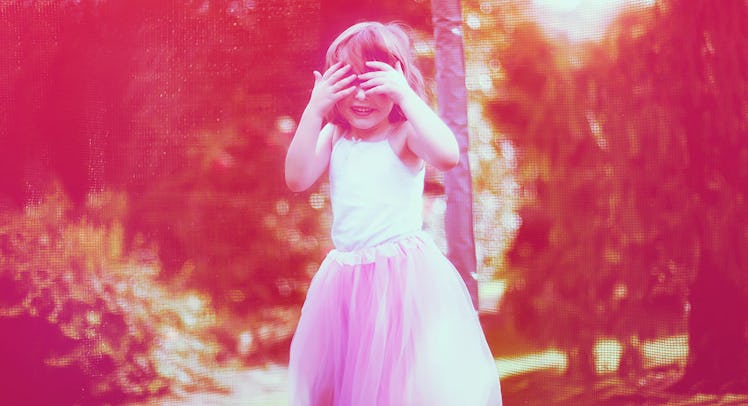Why Fathers Shouldn't Call Daughters 'Daddy's Little Princess'
She's the most beautiful thing in the world to you. But she's not royalty and she never will be. Get a new nickname.

Many fathers refer to their daughters offhandedly as “my little princess.” A subset of these father’s hear how patronizing that sounds and wonder if the phrase might prove damaging or inappropriate or in some way a betrayal of their commitment to support a strong young woman. After all, the word princess has connotations. Princesses are beautiful. Princesses are needy. Princesses get rescued. But princesses are also precious and, cloying as it may sound, so are daughters. So there’s the tension. It communicates a good feeling, but might also communicate a bad idea.
Although much has been made in the way of social critiques that highlight the term and its problems, these critiques are not often met with rigorous scientific studies. After all, it’s hard to quantify whether or not these terms and toys actually do harm to kids, and if so, the extent to which they do. There have been few longitudinal studies that link kids choices with the language their parents use and their outcomes later on in life. Dr. Lisa Dinella, a psychologist and professor at Monmouth University, is keenly aware of this. She has spent her career studying the relationship between gender identity, academic achievement, and career development. She’s studied reactions to kids films. She knows princesses.
Fatherly spoke to Dr. Dinella about the word “princess” and whether or not it posed some sort of threat. Her answers were unexpected and fascinating.
Your work focuses quite a bit on gender stereotypes. From your study, is there any understanding of when kids learn about gender stereotypes? Or start associating gender stereotypes with characters who are steeped in their gender, like, say, princesses?
We interviewed kids at two different age groups: preschool and early elementary school. When we asked them to describe princesses for us, it was really clear that they recognized gender stereotypes. They saw that princesses were more feminine-typed than the other characters.
We asked the kids questions like, ‘How much is a princess nurturing?’ ‘How much is a superhero aggressive?’ ‘How much is a princess a leader?’
Princess characters do have moments of acting across gender types and we thought kids might notice the pattern and remember that a princess was nurturing in one moment but acted like a leader in the next. That wasn’t the case.
So, kids recognize gender stereotypes. Is that a negative thing?
There is a research study that shows a connection in the amount of exposure kids had to princess genres and the amount of gender stereotyped behavior that the kids exhibited themselves over the course of a year. Kids are being exposed to these gender stereotypes at a really impressionable age, at the time when they are building what we call “gender schemas.”
That’s their set of ideas about what it means to be a boy and their ideas about what it means to be a girl. We know that those schemas act as filters and all people use those schemas as a guide for how they should behave, what they should like, what they should pay attention to, and how they should act. If we’re exposing our kids to unidimensional characters, depending on age, there’s a chance that we’re reinforcing gender stereotypes that might have an impact further in their future.
So what’s the problem with kids identifying very strongly with the character of the “princess”?
Well, there’s the need to be rescued. The need for help from others. A high emphasis on their physical appearance. Valuing somebody for whether they are attractive or not, at the cost of other traits being valued.
If you are to invoke that all of what it means to be a princess, you’re reinforcing those traits in the absence of reinforcing other traits. There’s nothing wrong with wanting to have a child that’s really nurturing. But we don’t think of princesses as being brave, strong, and courageous, aggressive leaders. We’re sending a message to girls that those traits aren’t as important.
I get the message, but it seems pretty cerebral. Are there any known real-world impacts of the use of these gender-specific-terms and characters around our kids?
Kid’s cognitive ideas about who they are oftentimes drive their actions and the things that they are interested in, activities, and hobbies. So there is a connection between how you act in the world and your desire to have your actions congruent with what you think it means to be a certain gender.
That all makes sense, but it’s also a term of endearment. It’s a way of saying ‘I love you’ without saying ‘I love you’ all the time. Does that redeem the phrase?
When people say things like ‘Daddy’s little princess,’ what they’re trying to do is they’re trying to show that they care about their little girl. I don’t have any problem with parents wanting to show their daughters that they are loved. But you run the risk of reinforcing that you’re only loving the feminine side of your girl. Choosing a not-gender stereotyped label would allow girls to feel that all of their traits and all of their interests are loved as well.
If you’re shoehorning girls into only being exposed to princesses and you’re shoehorning boys into only having experiences with superheroes, then they’re not getting a well-rounded, early experience. They’re only getting half of the options.
So it’s fine if you also call your daughter War Machine from time to time?
I’m not anti-princess. Or anti-superhero. That’s not the case. We would really love for girls to have exposure to both types of characters.